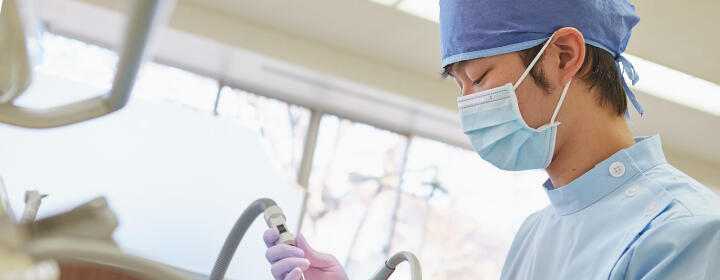School of Dentistry

CURRICULUM
To foster future dental professionals who are sensitive yet global, the department has systematically connected its general education and specialized subjects to its six-year program. In the first two years, students register for the courses in the liberal arts, which focuses on the student’s character formation, along with clinical and basic laboratory training. In the following two years, students take classes focusing on dentistry and medical knowledge. Various medical subjects relating to dentistry are prepared at this stage, and students can acquire wide-ranging medical knowledge. Additionally, they can learn the importance of gaining hands-on expertise through practical subjects. From the fifth year, students receive practical training for approximately one year at our affiliated hospital. Experience in an actual medical setting in 14 clinical areas, attendance at consultations, and practical training in a hospital environment meet the requirements to become a dental professional of the new era.
Major Subjects
Anatomy / Histology / Oral Anatomy / Physiology / Oral Physiology / Pediatric Dentistry / Orthodontics / Biochemistry / Oral Biochemistry / Infection and Immunology / Periodontology / Dental Materials Science / Mechanical Dentistry / Endodontics / Operative Dentistry / Complete Denture Prosthodontics / Partial Denture Prosthodontics / Crown Bridge Prosthodontics / Dysphagia Rehabilitation / Pathology / Pharmacology / Oral Surgery / Dental Pharmacology / Radiology / Oral Diagnosis / Dental Anesthesiology / Dentistry for the Aged / Forensic Dentistry / Welfare and Nursing Care (includes practical training) / Public Health Science (including Health Science) / Dental English / Dental Health / Sports Dentistry / Dentistry for the Disabled / Behavioral Science in Dentistry / Dental Practice Administration / Dental Information Science / Psychological Medicine / Medical Ethics / Internal Medicine / Surgery / Pediatrics / Dermatology / Otorhinolaryngology / Ophthalmology / Basic Seminar on Dentistry / Outline of Dental Medicine / Basic Dental Sciences / Comprehensive Lectures / Comprehensive Dentistry / Clinical Practice / Clinical Practice Experience
Substantial Overseas Training Programs
The department has created one of the best environments among dental educational institutions in Japan to foster international dentists, in the hope that students will engage in daily research and treatment with both a knowledge of dental technology and through a global perspective based on information and knowledge of global medical trends and a sensitivity to always staying up to date with the latest information and knowledge of dentistry.
Thirty-six students per year, or one in four fifth-year students, participate in overseas training programs (in the U.S., Italy, Finland, China, Mexico, etc., with the university paying all training expenses). Students learn about the current state of dental care and the latest developments while interacting with local students.
Thirty-six students per year, or one in four fifth-year students, participate in overseas training programs (in the U.S., Italy, Finland, China, Mexico, etc., with the university paying all training expenses). Students learn about the current state of dental care and the latest developments while interacting with local students.
National examination strategies
National Board Dental Examination
The wide-ranging expertise and skills that dentists require related to dental medicine and oral hygiene must be acquired along with various kinds of training. To become a dentist, you must also pass the National Board Dental Examination conducted by the Ministry of Health, Labour and Welfare. Our dentistry school trains outstanding dentists, and we’ve achieved a stable average passing rate of 79.3 percent for new graduates on the National Board Dental Examination for the past six years.
The National Board Dental Examination, which uses optical answer sheets (bubble sheets), asks compulsory test questions about basic knowledge, general questions on dentistry and dental healthcare, and clinical questions related to specialized subjects, including how to prevent and manage dental ailments, endodontics and periodontology required in clinical dentistry, operative, prosthetic and pediatric dentistry, and orthodontics, oral surgery and dental radiology.
The National Board Dental Examination, which uses optical answer sheets (bubble sheets), asks compulsory test questions about basic knowledge, general questions on dentistry and dental healthcare, and clinical questions related to specialized subjects, including how to prevent and manage dental ailments, endodontics and periodontology required in clinical dentistry, operative, prosthetic and pediatric dentistry, and orthodontics, oral surgery and dental radiology.
Academic Advisors Provide Meticulous Academic Guidance
In their fifth and sixth years, students are assigned a junior faculty member as an academic advisor. These advisors are responsible for ten students each. They provide careful academic guidance in preparation for graduation and the national dental examinations in collaboration with the academic year chairperson and the class chairperson.
